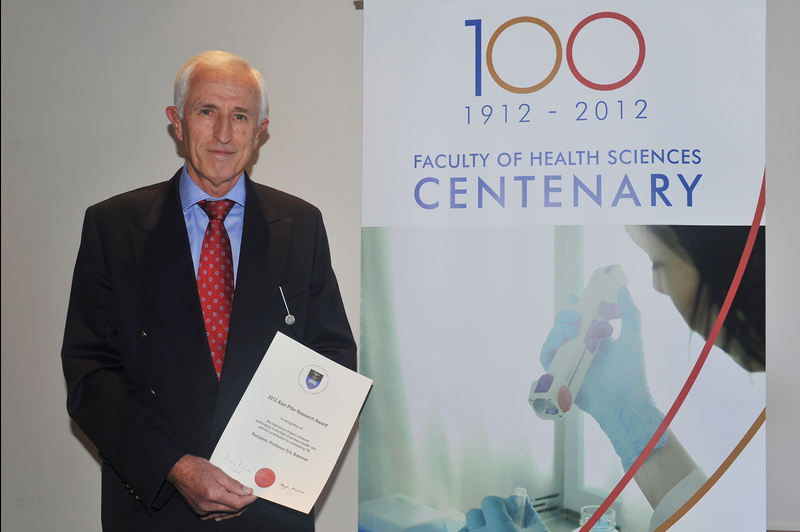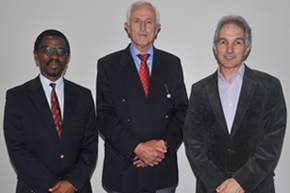Bateman wins 2012 Alan Pifer Award
15 April 2013
A commitment to use his "academic and enquiring skills" to contribute to society beyond the perceived confines of the laboratory and surgical theatre bagged UCT's Professor Eric Bateman the prestigious Alan Pifer Award for 2012.
This commitment was eloquently demonstrated by a lecture Bateman gave recently to the Thoracic Society of Australia and New Zealand, which he called The Public Health Clinician.
"The public health clinician is more than just a good doctor; he or she is someone who accepts the responsibility for taking their skills into the community and making a difference," explained Bateman, Professor of Respiratory Medicine at UCT.
The award, which Bateman received on 9 April, is bestowed annually on one or more UCT researchers whose work has - as Professor Danie Visser (deputy vice-chancellor responsible for research) noted - demonstrated relevance to the advancement and welfare of South Africa's disadvantaged people. Bateman received the award for the "impressive impact that his research has achieved, particularly in combating tuberculosis and improving primary healthcare".

Bateman was appointed head of the Respiratory Clinic in the Department of Medicine at Groote Schuur Hospital in 1989, and established the UCT Lung Institute in 2000, pioneering crucial health science research, said Professor Bongani Mayosi, head of UCT's Department of Medicine, who nominated Bateman for the award. The UCT Lung Institute has become an international beacon of innovative research, from new tuberculosis (TB) drug development to unique community-based, directly-observed therapy studies, and involvement in building and establishing infrastructure in clinics such as those in Langa and Chapel Street in District Six.
Bateman's fundamental contribution has been to improve primary healthcare, added Mayosi. "We are often accused of being elitist here at UCT, [of being] in our 'ivory tower', of not being relevant to people in the community, and I think the work that Eric has done has shown that in fact, the opposite is true," he said. Bateman was quick to pay tribute to those who instilled his sense of responsibility to society: his mentors. He credits one of those, Emeritus Professor Solly Benatar, with "having taught me, as a pulmonologist-in-training, that there was something better and even more important, perhaps, than being a good clinician, and that is to contribute as a member of society".
The ground-breaking research he was able to lead, says Bateman, owes much to his "terrific" team. "I see this very much as a team award." The veteran clinical scientist said he hoped that the award would further convince his colleagues (who already share his vision, he reports) that it was rewarding to do research that "makes a difference".
"I was able to say recently at this lecture that the rewards of working in Africa and South Africa are tremendous. Whatever you put your hand to, there's an opportunity to make a substantial difference. It's exciting work. It's the reason for getting up in the morning. Our researchers need to realise that they are in the golden age, the ideal place to make a difference."
 This work is licensed under a Creative Commons Attribution-NoDerivatives 4.0 International License.
This work is licensed under a Creative Commons Attribution-NoDerivatives 4.0 International License.
Please view the republishing articles page for more information.










